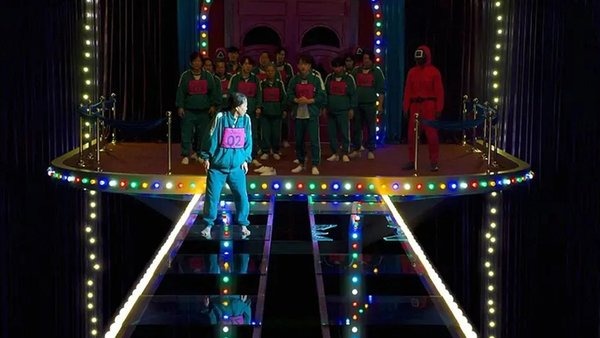Why Squid Game is such a powerful critique of capitalism
In October 2021, the South Korean survival series Squid Game (2021) took the world by storm. Taking a deeper look into the underlying themes in the series reveals that it is indeed a commentary on modern capitalism, and the wealthy inequality it brings.
Desperation is at the root of the “game”
The plot of Squid Game relies entirely on the financial desperation of the characters in it. If they weren’t poverty-stricken and in debt, the players in the game would not willingly jeopardise their lives for 45.6 billion won (£33 million). Their desperation for a better quality of life prompts them to put everything on the line. This was especially visible in Episode 5, when the protagonist, Seong Gi-hun, selects a man for the 'Tug-of-War' game, only to discover that he was partnered with his wife who came with him to the competition. Here, we meet a couple, who have possibly left children behind alone to increase their chances of winning the prize money and clear themselves of never-ending debt. They put all their eggs in one basket, risking both their lives. Their sheer desperation mirrors that of Korea’s destitute lower class.
The “caring” face of capitalism
Another similarity between the competition and capitalist society is the negligence of those with power. In Episode 9, Seong Gi-hun discovers that the old man who was his ally for most of the competition, was actually the mastermind behind it. The old man, Oh Il-nam, tells Seong Gi-hun that his motivation behind creating such a cut-throat game was boredom, and giving financially desperate people a way out. The latter was evidently a pretence of compassion. If the old man and the rest of his billionaire friends were that bored from having too much money, then why didn’t they just give it to the bankrupt players without anyone having to die? Instead, these sadistic, filthy rich tycoons sought entertainment in watching desperate people suffer in pursuit of financial security. Their exploitative behaviour embodies the individualistic ‘dog-eat-dog’ mentality that is the very foundation of capitalism, and mirrors the exploitation of the poor by the rich in capitalist South Korea.
The competition wasn’t truly meritocratic
The coordinator of the competition, the ‘Front Man’, prided the game on being truly meritocratic, but there were several scenes that brought this into question. The very first set of people that died during ‘Red Light, Green Light’ (Episode 1) were not given the same chance of survival as their counterparts who survived. The first man who was shot would never have anticipated paying the price of moving when the light turned red with his life… maybe by losing out on the cash prize, but certainly not with his life.
The ‘Tug-of-War’ game was also unfair, as the men had an advantage over women because of their physical strength. If physical strength was a determining factor in who wins the prize money, then just how meritocratic was the competition? Physical strength is usually innate, not earned through merit.

I particularly questioned the “meritocracy” in the Front Man’s decision to switch off the lights during the ‘Hopscotch’ game in Episode 8, preventing the man who had experience in glass manufacture from deducing which of the glass tiles was tempered. This façade of preserving meritocracy served to do the opposite. If some players were allowed to abuse their innate physical strength, then why could others not make use of the skills they picked up through their careers? The false claims of fairness are reminiscent of the denial of the wealthy elite in capitalist society, most of whom achieved their success with some form of an advantage (be it private schooling, trust funds, well-connected parents, white privilege, and/or male privilege), yet maintaining that their journey was completely meritocratic and untouched by any privilege whatsoever.
Why is the series so powerful?
The way Squid Game combines sitting-on-the-edge-of-your-seat thriller with allegorical social critique is seamless. So seamless that many wouldn’t even realise that they are watching a hyperbolic reflection of the society they live in. But I guess that’s what good art does: it makes us take a long hard look at ourselves in the mirror, without realising we are doing so.
Post a comment